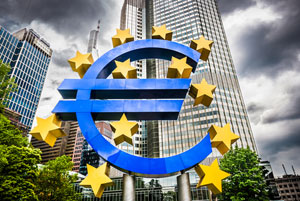Eurozone Financial News: The euro is falling.
So much so that today (Tuesday) it's trading at lows not seen since 2006.
It did gain somewhat as the day wore on. But in the morning, the euro hit a low of $1.1885.
This is just the latest in a prolonged downtrend that set in the second half of last year. After topping out at $1.3934 in March 2014, the euro has fallen nearly 15%.
Here's what has been moving the euro today...
Eurozone QE Looks More Likely in 2015
 The euro has been falling for most of 2014. What brought it to today's low was ultimately the specter of Eurozone quantitative easing.
The euro has been falling for most of 2014. What brought it to today's low was ultimately the specter of Eurozone quantitative easing.
European Central Bank President Mario Draghi has repeatedly floated the idea of a large-scale sovereign bond-buying program to spur growth and stave off deflation. This form of Eurozone QE could pump as much as one trillion euros into the European economy.
The ECB has, to this point, pursued QE-like policies - but not full-blown QE.
This included raising funds from stronger Eurozone countries to finance government debt purchases. The central bank has also purchased asset-backed securities - much like the U.S. Federal Reserve did in its QE programs.
But neither move is QE.
Past government bond purchases were financed by Eurozone funds raised through ECB programs, not "money printing." And asset purchases do little for the Eurozone because its financial system is hardly as deep or complex as the United States'.
Full-blown QE is the last monetary policy weapon for Draghi. And its future looks all but certain.
But it's not without its hurdles. QE currently faces opposition from the inflation-averse Germans.
And the European Union prohibits directly financing a country's debt. Legal challenges are sure to arise, and already have for past bond-buying programs.
But Draghi seems more than willing to revise EU treaties. His pledges to do "whatever it takes" to save the Eurozone have speculators shorting the currency, looking to get ahead of what seems like inevitable, QE-fueled euro devaluation.
The series of roadblocks Draghi faces on his way to QE only prolong the euro's fall.
That's the main catalyst, but there are other factors that magnify this decline...
Deflation: Not Just Greece's Problem Anymore
Deflation is the last thing the Eurozone needs. It kills demand in an already weak economy. It adds to the real value of debt in a region that has seemingly moved from one sovereign debt crisis to the next.
The ECB is tasked with keeping inflation at or slightly below 2%. But inflation has actually been steadily falling since it last hit 2% in February 2013.
And while the problem is much more pronounced for the weaker euro area members like Greece and Spain, it's beginning to threaten the greater Eurozone.
Recent data pegged Eurozone inflation at 0.3% in November.
Today, however, new data revealed that German inflation was at 0.1% in December. Deflation is no longer just a problem for the Eurozone periphery. It's also threatening the continent's strongest economy.
New inflation figures will be released tomorrow. The Financial Times reported that economists expect inflation of -0.1%. That would be the first negative figure since October 2009.
The mix of inflation data and forecasts further makes a case for QE.
And while that adds downward pressure, traders are also losing confidence in the Eurozone because of one of its smallest members...
Europe's Financial News Focuses on Greek Elections
Greek snap elections are slated for later this month. This is further eroding confidence in the euro in the same manner Greek elections have in the past.
In summer 2012, Greece faced elections as the economy rapidly deteriorated. High unemployment and social unrest had many blaming the EU and International Monetary Fund for imposing austerity measures on Greece as a condition to receive bailout money.
This thinking gave rise to the radical left-wing Syriza party. The Syriza party pledged to stop the austerity, a move that surely would have pulled bailout money off the table. It would have ultimately forced a Greek exit from the Eurozone.
Syriza didn't cobble together enough votes to take over the government in 2012, but the ideology has endured. The far-left message has become so strong that many predict the elections later this month could hand the Greek government over to Syriza.
Syriza's leader Alexis Tsipras doesn't want to exit the euro. But his platform of increased spending and further debt restructurings has the Eurozone wondering if Greece will be worth the hassle.
And not unlike 2012, Greek elections are once again raising the possibility of "Grexit."
QE Is Not Just in the Eurozone: Contrary to what the "experts" say, Japanese quantitative easing isn't going to bolster growth or help move the Nikkei. In fact, many Japanese stocks are going to fall flat. But not all of them. Fitz-Gerald shows you how to play this, counter to the trends...


